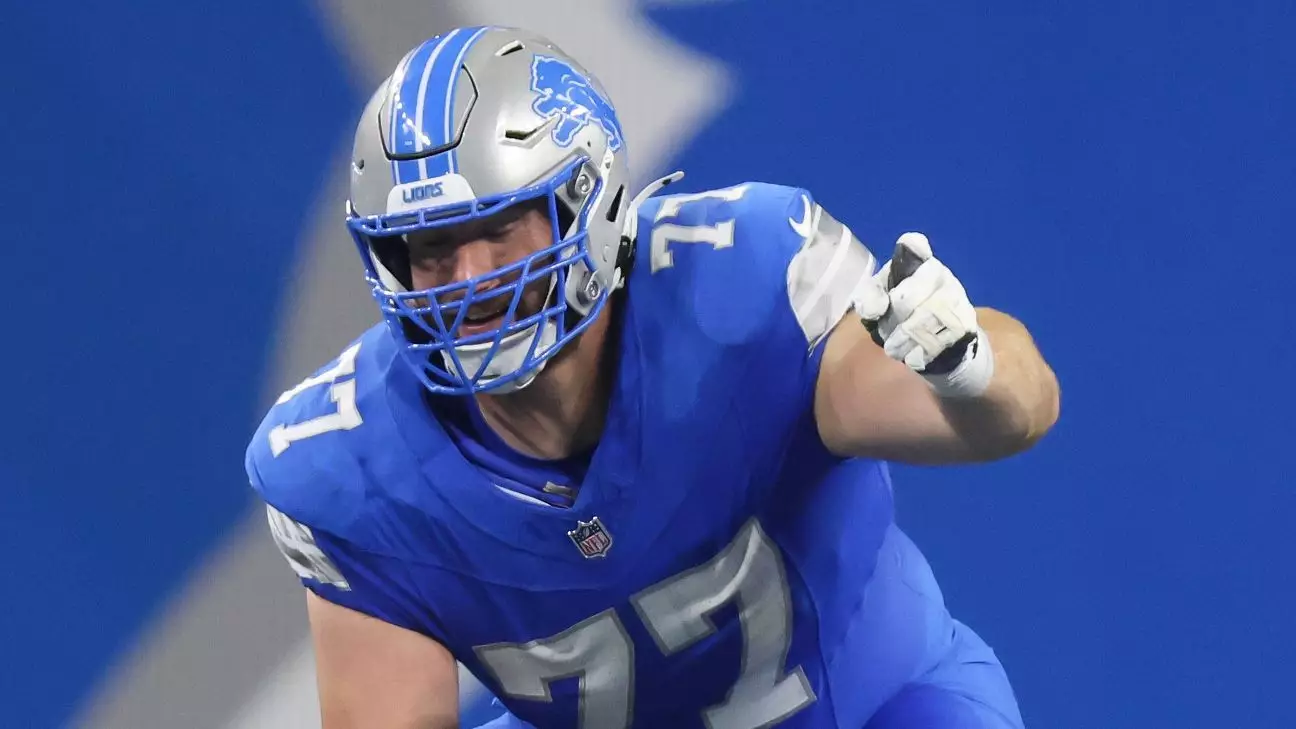In an emotionally charged announcement shared through social media, Frank Ragnow, the distinguished center for the Detroit Lions, has made the heart-wrenching decision to retire from professional football after a commendable seven-season career. His poignant message resonated deeply within the hearts of fans and teammates alike, as he reflected on his tumultuous journey filled with grit, pain, and determination. Acknowledging the toll the sport has taken on his health, Ragnow’s retirement is not merely a personal choice; it speaks volumes about the pressures athletes face and the sacrifices they are often forced to make.
Ragnow’s declaration encapsulated an internal struggle many athletes encounter as they navigate the line between career ambition and health. His candid remark about realizing, “I simply don’t” have more to give, underscores an all-too-common dilemma that athletes face when confronted with physical limitations. For Ragnow, the decision to prioritize his well-being and family’s future speaks to a vital and often overlooked aspect of professional sports: the human behind the armor.
A Career Marked by Perseverance and Resilience
Ragnow’s career was nothing short of remarkable, decorated with accolades that showcase his relentless dedication to the game. From being drafted as a first-round pick in 2018 to rapidly ascending into the elite echelon of NFL centers—earning Pro Bowl selections and securing a lucrative contract extension—Ragnow carved out a legacy built on hard work and an indomitable spirit. His significant achievements were often punctuated by moments of hardship, namely his battles with injuries that would have sidelined many others.
Consider the 2021 season, where Ragnow played despite enduring a fractured throat, a testament to his remarkable fortitude. Every snap he took on the field was a reflection of his commitment not just to the Lions organization, but also to the fans who rallied behind him—supporters who witnessed his unwavering resolve. His decision-making and leadership on the line contributed to the overall success of the team, further amplifying the impact of his retirement on both the franchise and fanbase.
Injury’s Unforgiving Toll
For all of Ragnow’s accolades and triumphs, the reality of injury shadowed his career path. Persistent and serious toe injuries haunted him over the years, with Ragnow openly describing them as some of the toughest challenges he faced. His struggle with “the most severe degree of turf toe” underscores an often-ignored narrative: the physical repercussions of playing at such a demanding level. His candid admission that certain injuries had transcended the possibility of surgical fixes raises pertinent questions about athlete longevity, chronic pain, and the long-term effects of competitive sports.
As Ragnow hangs up his cleats, it is crucial to acknowledge the broader implications of his journey. The stigma surrounding injuries in professional sports needs addressing; players shouldn’t be romanticized for their ability to ‘battle through’ pain but rather encouraged to prioritize their health and well-being. Ragnow’s decision reflects maturity, signaling to aspiring athletes that it’s okay to step back when the cost becomes too high.
Looking Ahead: The Next Generation
With the departure of a player of Ragnow’s caliber, the Lions must now seek a suitable successor to fill the considerable void. Rookie Tate Ratledge, a promising second-round pick from Georgia, appears poised to take over Ragnow’s role, signaling a new chapter for the franchise. As he steps into his shoes, Ratledge will not only have big cleats to fill but also the chance to learn from a seasoned veteran who exemplified resilience and leadership.
Fans and analysts alike will watch how Ratledge acclimates to the pressures of being a starting center, but the legacy Ragnow leaves behind isn’t solely defined by statistics and accolades. It is embodied in the culture of hard work, integrity, and health first he instilled in the team. Frank Ragnow exits as not just a phenomenal player but as a role model demonstrating that priorities can, and should, evolve throughout one’s career.

